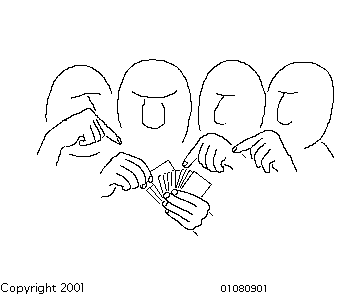Reading Eagle – 31 Ago 1941
There is possibly no lead at bridge which causes so many disappointments as the opening lead of a singleton. While there are times when a singleton opening is justified, it should never be resorted to without some definite idea regarding the chances of success. Most expert players usually avoid this lead, as the chances are two to one against the partner holding the winning card in the suit led. The reason for leading a singleton is obvious.
A player has two or three small trumps which are of no use to him, because as soon as declarer takes the first trick, he will in most cases immediately lead trump. Consequently, if a player can utilize one of his small trumps in ruffing, he will be one trick ahead of the contracting side.
But, on the contrary, if he holds four small trumps, then he should lead away from his longest suit and not the singleton. If Declarer has a five-card trump suit and the defense can force him to use one of these trumps for ruffing purposes, it will generally tend to weaken his hand materially. Declarer must now lead out all of his trumps in order to extract yours and this may bring about the establishment of an adverse long suit which will bring defeat to an otherwise easy contract.
Therefore, do not lead a singleton when your hand holds four of the trump suit. The late Wilbur Whitehead, one of the greatest players of all times, in his book on leads, placed a singleton seventh on his list of blind opening leads, but even then only when the hand held the Ace or King and two small trumps. Summing up the consensus of expert opinion on the subject, we find that a singleton may be a permissible opening lead when:
(a) Holding the Ace and one small trump.
(b) Holding the King and two small trumps.
(c) The partner has bid that suit during the auction.
(d) Player on your left has bid a suit and this suit denied by declarer.
In cases a) and b) the singleton leader is assured of being able to stop the trump play by declarer and still be able to ruff the suit in which he held the singleton. The third example needs no further amplification. In case d), it is generally a good gamble that your partner holds the missing high cards in the suit bid by dummy and may be able to take the first trick and give you a ruff immediately. Of course, a singleton lead in this instance is not justified if you have a desirable, suit of your own to open.
Three Ways to Play a Hand
We selected a deal from one of the local duplicates which afforded plenty of food for post-mortem discussion. South arrived at a four Spade final declaration, not by choice but because the opposition pushed them along by bidding both minor suits. In fact, after going down three tricks doubled, he plaintively asked North (his partner) why on earth he carried the auction to four odd. He claimed that dummy had bid his ultimate on the first round and under no condition did he have another possible raise.
North replied that he did not agree with his partner’s views and contended that if the hand had been played properly they need be set but one trick instead of three. However, the contract can be made by careful treatment as was demonstrated in several tables. Here was the distribution:
West opened the nine-spot of clubs, dummy winning with the Ace. The King of trumps followed and then the four, declarer playing the eight as he was evidently influenced by East’s double. West won with the Queen and returned the eight of clubs which was over-taken by East, and another club played. Declarer permitted this to hold, discarding a diamond. East then switched to a diamond and they cashed two tricks in that suit.
Declarer was forced to lead away from his hearts a bit later and conceded another trick for down three.
Declarer’s partner complained about South’s play, saying that he should have finessed the heart suit, instead of the trumps when he was first in dummy with the Ace of clubs. This would have held the posses to but four tricks instead of ‘six.
However, if proper thought is given to the play, four odd should be made and the South players who scored ten tricks all told were not just lucky in the play. When dummy is in with the Ace of Clubs, the Heart finesse must be taken.
East’s double does not mark him with the Queen of Spades but it definitely spots the King of Hearts. A small Heart is led to the second trick. the Queen winning. The Ace of that suit is played next, then the Ace of Spades and the Jack. Dummy’s King overtakes West’s Queen of trump and a small Heart forces out the King of that suit from East. Declarer ruffs high, retaining the deuce for entry into dummy so that he can play the high Jack of Hearts on which the losing Club is discarded.
Declarer cannot help losing the three Diamonds at the end.
